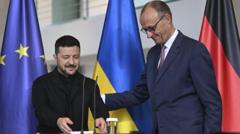Chancellor Friedrich Merz's upcoming meeting with President Trump is positioned as crucial for redefining Germany's role in Europe and global affairs, especially in confronting challenges from Russia.
Germany's Chancellor Merz Aims to Strengthen Ties with U.S. in Oval Office Meeting

Germany's Chancellor Merz Aims to Strengthen Ties with U.S. in Oval Office Meeting
Friedrich Merz seeks to establish Germany's global influence while navigating complex U.S. relations.
As Chancellor Friedrich Merz makes his way to the White House for a pivotal meeting with President Trump, he is determined to signal a new chapter for Germany on the global stage. Since assuming office in early May, Merz has positioned himself as a proactive leader in international trade, security, and the ongoing conflict in Ukraine. By aspiring to be a stabilizing presence for Europe, he aims to reinforce Germany's significance in navigating contemporary global challenges.
Merz, who leads a center-right government, faces the formidable task of managing U.S.-Germany relations amidst Trump's administration, which has shown suspicion towards Germany compared to other European allies. With the reputation of foreign leaders being a concern, particularly after tense exchanges with figures like Ukrainian President Volodymyr Zelensky and South Africa's President Cyril Ramaphosa, Mers recognizes that establishing a rapport with Trump is crucial for his agenda.
Merz has prepared painstakingly for this meeting, seeking insights from other leaders who have successfully navigated their encounters with the Trump administration. He aims to ensure that discussions in the Oval Office center on sustaining America's commitment to European defense, particularly in light of threats posed by an assertive Russia. Merz's goal is to clarify Germany's role as an essential partner in collective security efforts, particularly as tensions continue to escalate in Eastern Europe.
Ultimately, the success of Merz's trip will hinge on his ability to connect with Trump and convey a vision wherein Germany not only stands alongside its U.S. ally but reinforces its position as a central player in shaping European geopolitical dynamics.






















